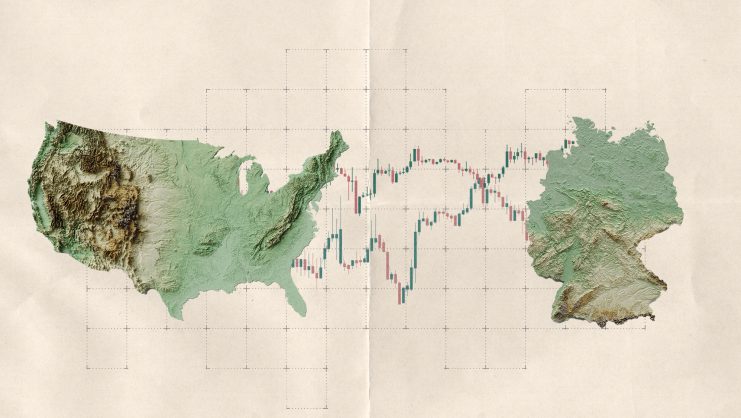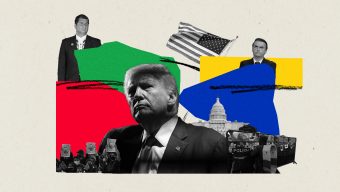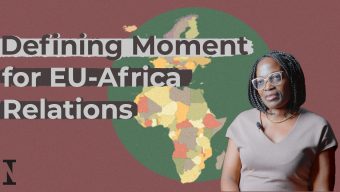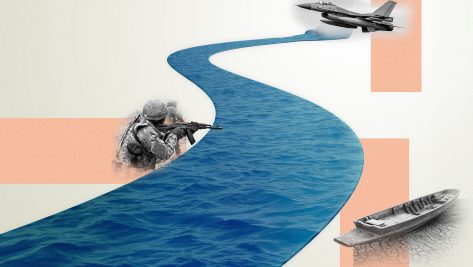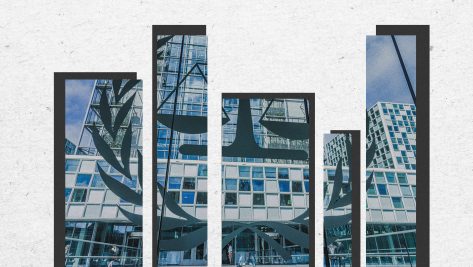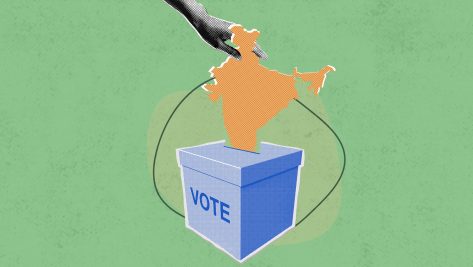Samir Saran on India’s Role in the Global Order
Where does India stand in a global order undergoing upheaval? Samir Saran, President of the Observer Research Foundation, speaks to Manuel Muñiz about India’s grand strategy, the role of China, and how the Global South sees the future of world order.
© IE Insights.
Transcription
Manuel Muñiz: Well Samir thank you so much for being here with us. I have a first question for you, which is about India. India’s vision of the world, India’s grand strategy, the type of global order that India would like to see if such a thing has been specified. But of course, India is going to be one of the central players in global affairs, it already is central to the Indo-Pacific and the region, but it will be central moving forward, perhaps even more so than it is today.
MM: So how does India view its environment and the world beyond? Is there such a thing as an Indian grand strategy?
Samir Saran: So Manuel first of all, let me thank you for having me here. Indian grand strategy is, as most grand strategies, a work in progress, do reflect the realities that countries need to grapple. Today, for example, India is more certain that its decisions to not be part of blocs or camps or align themselves to political agendas of others seems to be a reasonable one.
SS: It is important for India, that houses one sixth of humanity, 16% of all humankind, to put together a framework that serves this very large and young population, that caters to their immediate development requirements, that builds a future that will respond to their aspirations and that seeks prosperity, which is prolific and is inclusive. Now, in that sense India’s current and future course of engagement with the world is going to be primarily based on three big impulses.
SS: The first will has to have to be peace and stability. If we have to grow, if we have to put together everything that I’ve just mentioned, we require peace not only in our neighborhood but also in the world. Because India’s appetite to engage with the world is growing exponentially. We are today at two and a half trillion dollars.
SS: And you know, in less than a decade, we are going to be hitting the $10 trillion mark. Now, we will have a footprint in Latin America. We have deep engagement with the EU already. Africa and India are going to grow together. East Asia and India are today linked in multiple ways. And of course the U.S. and Western Europe continue to dominate in terms of being the most important partners.
SS: So we are going to be invested in peace around the world. So any Indian grand strategy has to be centered around that particular phenomena. The second, of course, is that we are seeing two big shifts. The first shift that we are witnessing is from the fossil fuel world to a green energy world, and the green energy industrial complex that is going to mushroom is going to be basically an Indian development.
SS: You know, we are going to be the first $5 trillion and then the first $10 trillion economy that would have powered itself on clean energy. We are less than two tons per capita emissions and we are close to $3.5 trillion. Go back in history, find me a $3.5-trillion-dollar economy that would have a per capita emission this low.
SS: We are going to probably maintain the same profile at 5, 10, 12, 15. So the green transition forces India to think about a global architecture that allows access to material, that allows access to components, that allows access to technologies that will continue to service this whole new green future that we are building together. So if oil dominated the grand strategies in the past, I think green energy and green supply chains are going to dominate the future thinking and India has to be cognizant of that.
SS: And finally, the digitalization from the real to the virtual, and to a virtual that has real-world consequences. And again, it means that tech diplomacy, governance of tech, technology that is safe, technology that deconflicts rather than creates contests, are all questions that are going to be resolved not by an independent nation or individual nation, but by a collective.
MM: We just saw the visit of Xi Jinping to Moscow. You probably saw the clip after the dinner of Xi Jinping and Putin speaking, saying: “We’re seeing changes to the world order that we hadn’t seen in 100 years. And you and I are driving these.” We didn’t need the clip to be leaked because this was in the press release, in the wording of the press release.
MM: The same thrust, the same idea. This leads me to this reflection. Are we moving to a world of blocs? Are we moving to a world of a democratic, liberal open bloc led by the United States, possibly Europe, parts of Latin America, of the Global South? And another bloc led by China, by Russia? Less democratic, less open. If we are, is the Ukraine war one of the pivotal sort of moments that is consolidating these blocs?
MM: So that’s a question on order. But if that world is emerging, where does India stand? Because really this world of blocs poses a huge challenge to the development agenda and the trade agenda, to the climate agenda, to the governance of technology, because it depicts a world of blacks and whites, and it’s going to be very difficult to build global governance arrangements when two of the largest actors are leading two blocs that see the world in zero sum terms.
MM: So in fact, this depiction of a world of blocs I know is incendiary and it outrages the Global South because it puts at risk all of these agendas. So what you’ve just described as the three axes seem in my mind to be under severe threat if that world emerges.
SS: We are seeing tensions that would suggest that warriors from the last century are back in business and they would like to carve up the world in easy, digestible parts. The good and the bad.
MM: Kissinger, by the way, just said the “Second Cold War”. So it’s almost like a labeling.
SS: I mean, you know Kissinger he was there in the first one as well, so you have these Cold War warriors of the past who want a new Cold War for the current. They are likely to push us in a certain direction of thinking as well as action.
SS: I don’t think the Global South is going to be impressed by that. I don’t think countries like India really cared too much about Kissinger then, and nor do they care about Kissinger now. The difference between India then and India now is just a few trillion dollars of GDP and a few trillion more that we will add to our GDP.
SS: So if he was inconsequential when we took our decisions in the last century, for example, support the folks in East Pakistan who wanted an independent country, respond to the genocide that was underway despite American pressure, despite Kissinger and Kissinger-style politics that was being thrown at us, a perverse politics that was more convenient and more based on chessboard decision-making rather than on people’s lives and human outcomes.
SS: You are going to see countries reject that. In fact, I’ve spent a week in Europe and I saw Europeans rejected. I was in Berlin at this big roundtable of thinkers, and I could see voices from across Europe were mortified that they would need to choose between the US and China. They wanted US and China, not US or China.
SS: And they want a China that behaves, we want it too. They want a China that is less belligerent, we want it too. They want a China that doesn’t try to reshape borders and destroy the rules-based system that they have so carefully crafted. Guess what? Only they do, because many in the Global South don’t believe that the rules-based order was written by the Global South.
SS: And here China has a greater resonance, has greater appeal with certain countries. Countries are not going to see Ukraine as a decision point. I had a very interesting graph I saw, all of the countries that have sanctioned Russia. If you look at the countries that have sanctioned Russia and the countries that got their first doses of vaccines, they’re the same countries. The Global South is going to remember the three years of the pandemic when their vaccines were being thrown in trash bins in developed countries and not being sent to their geography.
MM: We’ve just seen also the AUKUS agreements sort of announced, it’s about the transfer of nuclear technology and capability to Australia, but also on missiles, on intelligence and a number of advanced technologies and others.
MM: We also have now the Quad arrangement that the government at the heads of government level, which we hadn’t had in the past. What do you think would be India’s reaction to start off with if China behaved in the ways that these members are fearing that it will say in the Taiwan Strait, if there was an invasion of Taiwan or a long-term blockade of Taiwan?
SS: India doesn’t have to have a scenario to understand China. We have 100,000 troops facing Chinese troops currently in the Himalayas. China is trying to change the map of Asia currently on our borders, Europe has woken up to defend democracy very late. We’ve been defending democracy a little while earlier, when Europe was siding with the dictator in Pakistan and with the Communist Party of China to counter the Soviet Union first and now Russia.
SS: We have been responding to China for a bit. We know how Chinese behave. So there is no doubt in my mind the capabilities that we need to build to fend off Chinese muscularity to make sure China behaves itself, to draw red lines is important. And for that, whether it is AUKUS or Quad or any other arrangement that can enforce good behavior from Beijing, is good for the world.
SS: A Beijing that behaves well is good for everyone because we have a very strong economic actor in Beijing that is going to benefit not only Europe, which it already does, but also Africa and Latin America and other parts of the world that still need to grow, develop, and climb the development ladder.
MM: But your hope is that this encouragement of good behavior is done through soft means, through harder means, if necessary, but this doesn’t lead to a world of blocs. So what is the difference between this discourse and the US discourse? Which is we’re headed for a structural collision with China.
SS: Sometimes you need to read the Chinese playbook to understand how perhaps you need to deal with China. China found it absolutely fine, and finds it absolutely useful, to have a very belligerent political posture with Japan, for example, and yet have Japan as their second-largest trading partner.
SS: It has built hundreds of billions of dollars of trading relationship with America, while threatening America and its bases and positions in the Pacific. And of course, it is aggressive with India, even as it does over $200 billion of trade with India. I think we don’t need to find… A) We need to drop a European money-chain mindset.
SS: Everything is not black and white there are greys, and the world we live in today is going to be more grey than ever. We are in the digital world, which is chrome. It’s an age of chrome, everything is grey. Let’s find peace in grey. You can be extremely tough and you can build deterrence capabilities and you can build military capabilities to enforce good behavior while having robust and strong trade and economic ties. China did it for 20 years or 25 years.
MM: I hope you’re right, by the way, because this world where there are no greys, it’s a very painful world. It’s one where cooperation is harder, is very inflationary. We’re going to rediscover what it means to have these supply chains broken and undone. And that’s a complicated world. Let me ask you a final question. Where is Europe in the Indo-Pacific? So when you look at the world from Delhi and you try to understand all of these pieces of the puzzle, where are we? Are we relevant on the economic trade piece and the security piece? Where would you like Europe to be? Do we need to pivot to Asia?
MM: Try to build more constructive relationships in Asia? Maybe try to water down this black or white approach that our colleagues from the other side of the Atlantic seem to have? Where do we fit in all of this?
SS: Sitting in New Delhi, perhaps Europe is the single most consequential actor for them. And I say this with all seriousness. I mentioned the green transitions, and I believe Europe is India’s key partner in that.
SS: I mentioned a digital future, and I believe the regulations for the future, the governance architecture of the future, is going to be shaped by New Delhi and Brussels because we will have to moderate the mercantilist urges in Washington and the authoritarian urges of China. We will have to create that third way, where countries have space and room to manage their digital futures in manners that are consistent with their own cultures and contributions.
SS: And I think that’s a big partnership again. And finally, on peace and security, the EU will have to work with countries such as India to ensure that we don’t get pulled to the margins and into conflicts. But we strengthen the center and hold it there. And I think, of course, Ukraine is too close to home. Every European is passionate about it and its geography matters.
SS: And it’s on the borders. But we will have to rise above this and we have to find a way that the most important ingredient of some success that we achieved in the last 70 years, which is a degree of stability and peace, can be preserved and can be pursued in the future as well.
MM: Well, it’s wonderful to have you here and to see this view, because this is the view from the Global South and in particular from India, which is going to be a fundamental builder of this architecture.
MM: The Ukraine issue is tough for Europeans, not just because it’s very close, but also because of the substance. And I think we’ve done maybe not too good a job describing this as a neocolonial war of aggression and maybe linking it to this global order debate. This is the ‘autocracies’ attack. I think that’s a much weaker argument, to be quite frank, than an argument on international law, on territorial integrity, on sovereignty, which I think would have resonated more with countries around the world that have been the victims of colonial wars in the past.
MM: Although I think that was a high mountain to climb because of the history, both recent and longer-term history of Europe and the United States in different parts around the world. But this is a new world order that we are entering. I think India is going to play a fundamental role, and we’re very grateful that you’re here to share with us your thoughts and your ideas and your analysis of what India would want to see and will be a part of building. So thank you Samir for being here.



